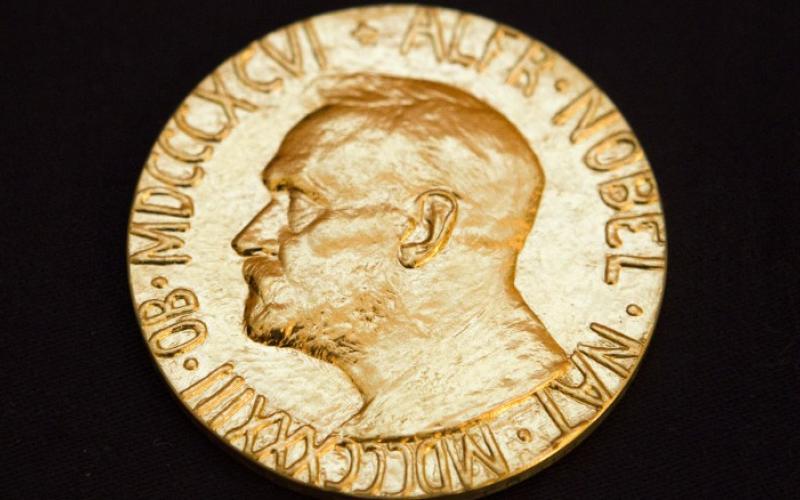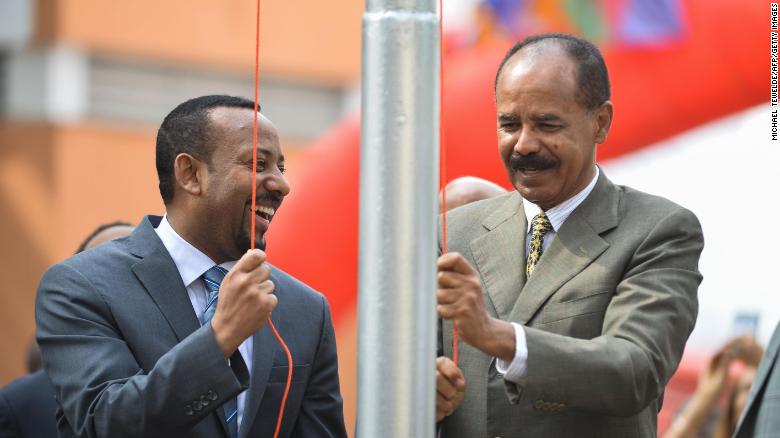
Addis Ababa, Ethiopia (CNN)Prime Minister Abiy Ahmed of Ethiopia has emerged one of the favorites to win this year's Nobel Peace Prize from a list that includes Greta Thunberg, the 16-year-old Swedish climate change activist.
Abiy is the second favorite to win after Thunberg, according to bookmakers Betfair and William Hill.
The winner is set to be announced Friday at 11 a.m. ET.
Awol Allo, a fellow Ethiopian and an associate professor of law at Keele University in Britain, said the Prime Minister deserves the prize for his role in ending the 20-year war between Ethiopia and Eritrea -- a largely pointless war over disputed border territory that came at a huge financial and human cost to both countries.

Abiy, left, and Eritrean leader Isaias Afwerki celebrate the Eritrean Embassy's reopening in Addis Ababa.
"I think what Abiy did with the Eritrea issue was very courageous and remarkable. I think a lot of people have considered that what he has done is worthy of such a recognition.
"The two countries are no longer in the state of war. Families have been reunited because flights are now running between the two countries. Relations that have been severed for 20 years have been rekindled," Allo said.
The 43-year-old Abiy also recently won plaudits for his role in helping to broker a power-sharing deal in neighboring Sudan, after a political crisis that led to the arrest of Omar al-Bashir, the country's ruler for almost three decades.
"That also speaks to someone who takes peace and stability in the Horn of Africa seriously," Allo said.
Plaudits and criticisms
Abiy became Ethiopia's Prime Minister in April 2018, the first Oromo to lead his country.
He has received both praise and criticism for his reforms in one of Africa's most populous nations, with more than 100 million people.
The early months of his premiership were marked with bold and progressive decision making; he released the country's political prisoners, denouncing their torture and also freeing jailed journalists. Abiy also met with the political opposition and civil society to discuss reform and invited previously exiled political parties to return to their country. He embarked on major institutional reforms, including the security and justice sectors.
Women were not left out of his progressive agenda. Abiy showed his commitment to gender equality by appointing women to half of his cabinet.
The international community has largely embraced his initiatives and reforms, such as the planting of millions of trees in the country to curb the effects of climate change.
'Appeasing Westerners'
However, some believe that Ahmed is not worthy or deserving of the Nobel Prize. They include Daniel Berhane, a prominent blogger based in Ethiopia's capital, Addis Ababa.
"I do not think he will or should win. If that happens, it will be an endorsement of a person that does not like institutions or teamwork but just churns out half-baked ideas aimed at appeasing Westerners," he told CNN.
"A win will exacerbate his narcissism and would be detrimental to the prospects of institutionalized reform and stability of the country."
Jawar Mohammed is an influential political figure within Ethiopia and within the country's large diaspora communities in North America and Europe.
He applauds Ahmed's work so far but believes there is still a long way to go before his reforms can bring stability to one of the most troubled regions in the world.
"Prime Minister Abiy has done a wonderful job in bringing peace with and within the neighboring countries," Mohammed, the executive director of the Oromia Media Network, told CNN.
"However, he has to do a lot more to bring peace and stability domestically and to ensure the transition to democracy succeeds."
Fast-growing economy
Abiy has been grappling with the displacement of people in different parts of the country, including in Oromia and Amhara regional governments.
According to the Internal Displacement Monitoring Centre, about 2.9 million people were newly displaced in 2018 because of conflict in Ethiopia.
The lack of security is threatening the foreign direct investment pouring into Ethiopia since Abiy opened up state-controlled telecoms, electricity and even the national airline to investors. The country's gross domestic product is expected to reach about $100 billion by 2020, making it one of the fastest-growing economies in the region.
source. CNN
The rest of the world may be mired in speculation about his nomination or whether he is favorite to win, however, it is business as usual for the Prime Minister, according to his aide, Billene Seyoum.




